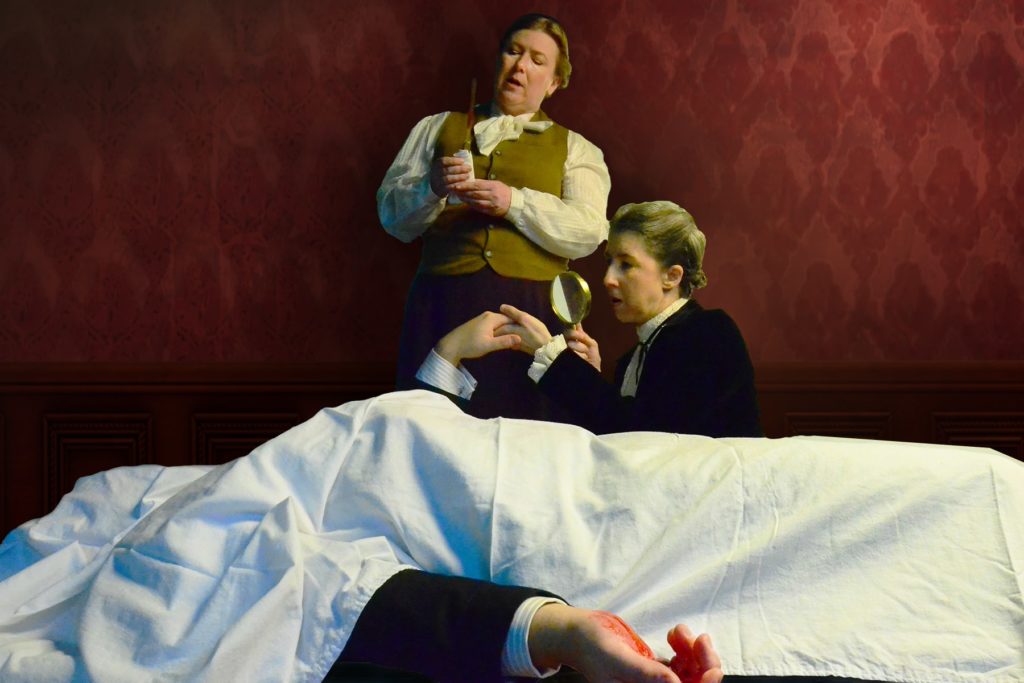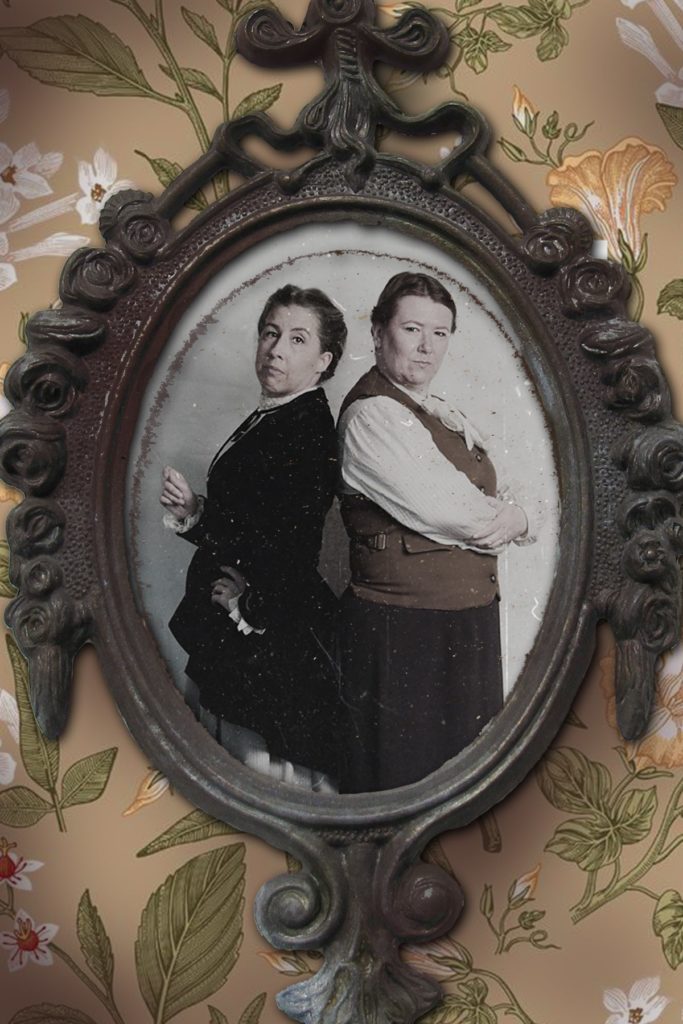A few weeks into rehearsal, dramaturg Maren Robinson sat down with Katie McLean Hainsworth and Mandy Walsh who are reprising their roles as Miss Holmes and Dr. Dorothy Watson for Miss Holmes Returns to talk about playing Victorian superheroes.
MR: Katie and Mandy, most stage actors don’t get to revisit the same characters in a new story. What does it mean to you to be able to return to these and get another opportunity to build on their relationship and take us on a new adventure with them?
MW: It’s a tremendous gift to be able to revisit Watson in this new story, especially since we had no idea if we’d even be able to do this show after everything with COVID. Even though it has been a minute since I played Watson, I still felt very close to her coming into this rehearsal process. (The recording of the audio drama version of Miss Holmes during the pandemic helped too, like a little refresher.) Having that thorough understanding of Watson going into Day 1 of rehearsals, it really opened me up for an even deeper exploration of who she is at the start of this play. AND being able to do all of this alongside Katie’s Sherlock? A total dream. We easily picked up where we left off – the trust and intimacy have already been built. As an actor, it really felt like being a kid in a candy store!
KMH: It’s a real thrill to get to step into Sherlock’s shoes again, and a huge boon to get to continue the journey with two other members of the original cast. I consider Mandy a great friend IRL so there’s a comfort level there that allows us to dig deep more quickly and efficiently than if we were starting from scratch. In rehearsal there are about a thousand small decisions in every scene that we don’t have to make because we already know the answer that makes sense for the relationship.

MR: When we met Miss Holmes and Dorothy Watson in Miss Holmes they were at the start of their friendship and working relationship now four years have passed. Do you feel their relationship is different?
KMH: One of the first things that struck me when I read the script was that–at least as far their investigations go–Holmes and Watson have developed a sort of short-hand in the way they speak to each other. In the last play, Sherlock had to explain everything to Watson, which makes Holmes very frustrated (canonically!). I remember one scene in MISS HOLMES where Sherlock pulls out a magnifying glass to study the floor of a crime scene and Watson asks, “What is that?” Getting through the response, (“It is a magnifying glass.”) without laughing was a struggle. There’s none of that now. Outside of their investigations, their relationship has evolved as they begin to understand each other more. Watson’s influence on Holmes is, in many ways, the crux of the sequel–so I don’t want to give too much away talking about it here!
MW: Their relationship has definitely deepened on so many levels since we last saw them. They are truly comfortable with one another here. Even when there isn’t dialogue between them, so much is communicated with a simple look at one another. This doesn’t mean there isn’t anything to be discovered in their relationship, though. Watson definitely sees some new things in Sherlock through the events of this story. Watson and Sherlock had an instant chemistry upon their initial meeting in the last adventure, but there was still a sense of them getting to know one another through their work. This time, we get to see them really working in tandem with one another. Watson has a greater understanding of Sherlock’s methods and logic, and even though she’ll never quite be able to do what Sherlock does, she can at least keep up with her and use her own talents to compliment Sherlock’s. In the first story, Watson was always at least one or two steps behind Sherlock. We get to see them at their full strength as a team here, as well as best friends.
MR: It has always struck me working on these plays that the male Holmes and Watson may operate outside the law but are always upholding British Imperialism. The female Holmes and Watson are already operating outside British Victoran social norms just by being women. Do you think they have changed in their political understanding of their work over the course of the plays?
MW: For Watson, I believe the work has only deepened her mistrust of British Imperialism, which has its roots on a very personal level for her. In both stories, we hear about Watson’s brother who suffered from PTSD and died by suicide after serving in The Second Afghan War. It is still a source of deep pain for her years later. I think it has been very hard for her not to carry some resentment towards the government about these far off wars that robbed her of her beloved brother, but her anger was on more of a micro level before she began working with Sherlock. Through their work, Watson has witnessed how Britain’s imperialism and patriarchy has affected other innocent lives, so her awareness has definitely grown beyond her own experience. Together with Sherlock she has been able to push back on these ideals and norms, but it’s tricky because of their relationship with Sherlock’s brother Mycroft. There are limits to what they can do.
KMH: One of the great things this script explores is how the Political really is Personal. You can’t separate the two–or maybe you can, if you exist in a body that enjoys the highest forms of privilege at all levels–and I don’t think you should. I’m always amused when people complain that actors or other celebrities should “keep their mouth shut” when it comes to politics and “stick to acting/sports/brand influencing” — as if these people aren’t human beings who exist in a society. In this play specifically, Holmes is forced to confront things she’d typically rather not clutter her mind with (and the male version simply won’t). The way she handles these confrontations has powerful consequences for her story. Again…no spoilers, sorry!
MR: Playwright Chris Walsh always gives actors some great historical events within the midst of a mystery. Were there new things you learned about this moment in British history that you felt had an impact on how you thought about your character?
MW: My personal history lesson for this show concerned The Contagious Diseases Acts, which I had never heard of before starting work on this show. They were basically a horrible set of laws that were supposed to help curb STDs and prostitution but ended up ruining thousands of people’s lives. We learn that Watson has personally seen the effects of these laws and has been following the movement to repeal them very closely. Watson’s temper was often on display in Miss Holmes. So many of her outbursts came from a place of frustration or uncertainty in her circumstances, but in this new story, Watson’s personal situation is much more grounded. The Acts serve as a spark for her passion and temper this time around. It has been really fun exploring those old traits, but having something new to fuel them and how does that affect how it comes out onstage.
KMH: The Contagious Diseases Acts. I almost can’t even talk about them–not just because they were so phenomenally devastating to women at the time, but because we are currently living in a world that doesn’t appear to have progressed much beyond that way of thinking. It’s interesting to think of our Sherlock in relation to the havoc these acts wreaked on so many women’s lives–how close she might have come in her experience to falling victim to them, possibly saved only by the class privilege she enjoys and the protection of her brother, Mycroft. (Sherlock, of course, does not dwell on theoreticals of this nature…but I sure do).

MR: Let’s talk about costumes, here you are, essentially being female Victorian superheroes. There is some action, there are some guns, and you are doing this all wearing corsets. When you think about your character are there things about those costumes that are helpful for you in creating your character’s life on stage?
KMH: Oh, I love my costume. It’s being built right now, but I’ve had one fitting and it’s amazing. But to answer your question, costumes are integral to how a character moves through the world, and personally, I never feel quite at home in a character until they’re dressed. Sherlock, in particular, rides a fine line of needing to conform to society’s expectations just enough to not garner unwanted attention, but not so much that she is hindered in her investigations. From a technical perspective, I have worn a corset, rehearsal skirt, and character shoes in rehearsal since the first day we were on our feet. Sherlock is often delivering a lot of information quickly, and having enough air to support her dialogue is critical. I had to start building stamina from Day One to ensure I can get through a full run of the show without running out of steam because of my restricted clothing.
MW: So due to a surgery I had last year, I’m not really able to wear a traditional corset right now. I feel like I’m cheating! Although I am wearing a type of binder for the show that still gives that sense of compression but is a little more forgiving on my abdomen. But when you add the bustle and skirts to it, I still feel like I’m buried under all of this stuff. As Watson, I instinctively find myself fighting against it onstage when she’s working through something or in less formal company. It’s Watson’s own little act of rebellion against societal norms.
MR: Thank you so much for spending some time with me during a busy rehearsal process. Is there anything else you’d like to share with an audience before they come see the show?
MW: I’m really excited to share this story with audiences and to be back at Lifeline! For those who didn’t see the first one, you won’t have a problem jumping right in. For fans of Miss Holmes, there’s a smattering of little nods to moments from that story that are really fun for Katie and I to play, so we hope that you appreciate them as well. Either way, I sincerely hope you will come out and support live theatre!
KMH: I hope people enjoy watching the show as much as we enjoy doing it. Getting to share my take on such an iconic and beloved character is a singular experience and it’s important to me that Holmes’ fans don’t feel like I let them down!
Catch Katie, Mandy, and the entire Miss Holmes Returns cast right at Lifeline Theatre until October 16!

